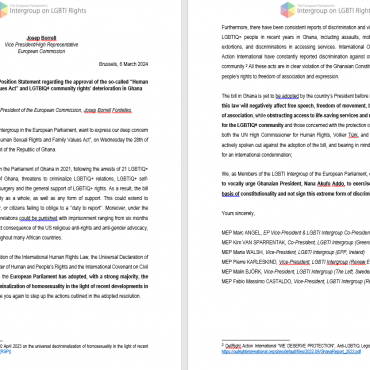Intergroup responds to accusations from Cyprus MP
Earlier this year, Andreas Themistocleous MP declared: “just because there exist among us paedophiles, people who practice bestiality, necrophiliacs and other criminals, should the state legitimise their status too?” The Intergroup on LGBT Rights wrote to Mr Themistocleous asking him to apologise.
Andreas Themistocleous responded to our letter extensively, accusing the Intergroup of interfering with democracy and attempting to “vilify” him. Michael Cashman and Ulrike Lunacek MEPs have written again to the Member of the Cyprus Parliament, clarifying the Intergroup’s position.
To: Andreas Themistocleous MP
Cc: Eliana Nicolaou, Commissioner for Administration and Ombudswoman;
His Excellency Mr Andreas Mavroyiannis, Permanent Representative of the Republic of Cyprus to the European Union
Concerns: Re: Derogatory remarks on same-sex relationships
Brussels, 8th July 2010
 Right Honourable Andreas Themistocleous,
Right Honourable Andreas Themistocleous,
Thank you for your response. Our initial letter expressed concern at your remarks likening homosexuality to paedophilia, bestiality and necrophilia. It did not seek to express sympathy with ‘our co-mates here’; it did not infer that Cyprus had any obligation to establish a legal status for same-sex couples under EU treaties, the Charter of Fundamental Rights, or other international laws; and it did not constitute, as you wrongly suggest, ‘a serious and real danger of penalization of the political process and adoption of an altered and obscene fascism’.
Whilst we respect your right to respond publicly by publishing your letter, we wish to address several of your assertions that facts fail to back up.
Our letter did not aim to ‘vilify’ you, but responded to the harmful comments you made in the exercise of your elected functions. On the contrary, it could be argued that your initial comments did seek to vilify lesbian, gay and bisexual people by assimilating them to authors of morally-reprehensible acts.
Furthermore, our asking for an apology had nothing ‘profoundly anti‑democratic’, nor do we see how it ‘offended the meaning of democracy itself’. Our open letter did not alter your right to express yourself freely in any way. We reiterate, however, that directly-elected Members of Parliaments should refrain from harmfully assimilating lesbian, gay and bisexual people (or members of any minority) to authors of morally‑reprehensible crimes.
You claim there is a causal link between countries providing same-sex couples with a legal status, and decriminalising bestiality. As fellow law-makers we can hardly think of a causal link between the legal status of same-sex couples and animal welfare legislation. Such assimilations are traditionally used in a populist fashion to encourage linking homosexuality to practices such as zoophilia (and other reprehensible practices such as paedophilia and necrophilia, which you referred to). A causal link, however, simply does not exist.
We respect your ‘right to have [your] own cosmic theory and philosophy’, and this is why we did not call for Cyprus to adopt legislation granting legal recognition to same-sex couples—a competence which remains squarely with each individual Member State. However, in our view your duty as elected representative should be fulfilled by respecting the citizens you represent, regardless of your personal opinion concerning their gender, ethnicity, ability, age or sexual orientation. You assert that cultural traditions must be respected; but this should not include openly insulting your constituents, or values of universal fundamental rights.
Finally, your assertion that no discrimination on grounds of sexual orientation were recorded in Cyprus in recent years is at odds with data from the Office of the Commissioner for Administration, which reports that two complaints were received in 2007; two in 2008; four in 2009; and so far one in 2010. It can be assumed many more would have been recorded, had public figures—including politicians—not made harmful statements encouraging LGB people to stay silent.
You conclude by suggesting that European integration is at risk should it be equated with the ‘decomposition and destruction of national, social, religious and cultural identities and characteristics of the EU people and their subsequent crushing and devastation’. Again, we respectfully disagree. The European Union is a community of shared values, and through the treaties and the Charter of Fundamental Rights all 27 Member States have subscribed to the same principles, agreeing to work together for the greater good of over 500 million citizens—regardless of who they are.
Michael Cashman MEP, Co-president
Ulrike Lunacek MEP, Co-president
Read more:
- Download the letter in English (PDF)
- Download the letter in Greek (PDF, courtesy of Accept LGBT Cyprus)





